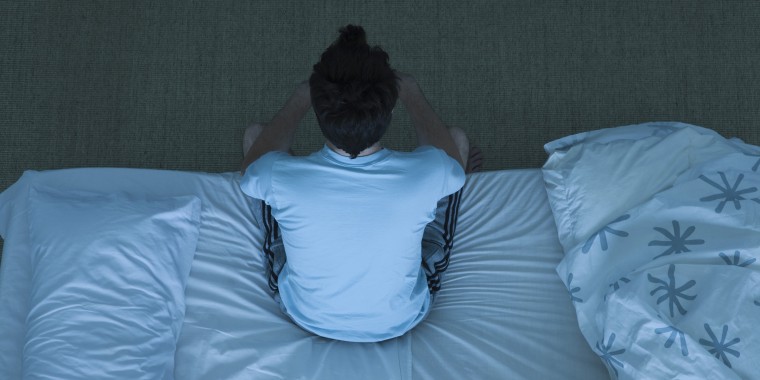You wake up, and there’s not a spot of sunlight to be seen, so you reach for your phone and check the time — it’s 3:14 a.m. Again. Or, you’re reading a work report midafternoon when your head nods down and you jerk awake. Or, your partner complains that you snore — but a lot of people snore, right?
Are these normal sleep disturbances, or signs you should see a sleep doctor? Sleep experts say there are some key times you should seek help for your sleep problem.
You — or your bed partner — can’t get through the day
If you can’t function properly in the day — or your partner can’t — talk to your health care provider. Watch for:
- Daytime drowsiness. “If you’re reading a document at work and you’re struggling to keep your eyes open, that’s not normal,” Dr. Sanjay Patel, the medical director of University of Pittsburgh Medical Center’s Comprehensive Sleep Disorders Program told TODAY. “A lot of people will excuse that by saying, ‘Well, it was boring.’ But when you’re bored, it’s normal to daydream and think about something else. It’s not normal for you to fall asleep.”
- Falling asleep while driving. That’s another red-flag sign you should seek care for your sleep problems.
- Snoring or trouble breathing. Sometimes, you don’t realize you have a sleep problem, but your partner does. “If your snoring is so loud that your spouse can’t get a good night’s sleep, you should get that checked,” said Patel. Your partner might also notice that you stop breathing during the night.
Get more tips in our Sleep Better TODAY guide
You’ve tried all the tried-and-true techniques for better sleep
You exercise and get sunlight in the morning, keep naps to a minimum, and keep your room cool, dark and quiet.
“It’s worth taking that next step if you’re having difficulty falling asleep or staying asleep and it’s not solved by applying basic good habits,” Dr. Douglas Kirsch, a member of the American Academy of Sleep Medicine and medical director of sleep medicine for Atrium Health told TODAY. “There’s a tendency to put off sleep problems.”
Here’s how a doctor can help
Start with your primary care physician (PCP). Sleep disorders affect one-third of people at some point, and PCPs handle a lot of sleep conditions such as sleep apnea and insomnia. If you’re still struggling to get enough quality sleep after working with your PCP, you can see a sleep specialist.
Your doctor will start by asking for your medical history and your sleep patterns. Talking to a doctor can clarify the changes you should be making. For example, maybe you have been having trouble sleeping during the pandemic. Your doctor can talk you through what’s different.
“A lot of it has to do with getting back on a regular schedule,” Patel said. “For a lot of us, our work schedule is taking over our lives. And we’re not having that downtime to enjoy life and to set aside time to sleep.”
You might think you don’t need to see a doctor to know you should set a schedule and make time for things you enjoy. But talking to an expert can make a difference. “Having somebody tell you that you should set those boundaries can motivate you to actually do it,” Patel said.
A doctor can also point out problems in your sleep/wake cycle you might not spot. For example, you might stay up later and sleep in later on the weekends. You know you should stick to a consistent schedule, but you don’t do it. When you finally see a doctor, it can motivate you to make changes.
A doctor might also notice you’re giving yourself too much time to sleep. Kirsch saw a patient who was trying to sleep from 10 p.m. to 8 a.m. and took a long afternoon nap every day. It’s no surprise she was waking up at 3 a.m. — she was sleeping too much. Kirsch recommended cutting time in bed down to nine hours and keeping the afternoon nap to no more than 30 minutes so she could sleep through the night.
And, you might not be counting all of the sleep time you’re getting. If you fall asleep watching TV at 8 p.m. and wake briefly to go to bed at 11 p.m. you might wake up at 4 a.m. — you’ve been effectively sleeping for eight hours.
The next level of testing and treatment
If your doctor suspects a sleep disorder such as sleep apnea or REM sleep behavior disorder, the next step is probably a sleep study.
You used to have to spend the night in a sleep center for a sleep study. But now, you might be able to do a study at home with monitors you can put on yourself. With the results of the study, your doctor can likely diagnose your sleep problem and recommend treatment.
For a lot of people who snore or have trouble breathing at night, a continuous positive airway pressure (CPAP) machine can help. Others might get medication, though that’s typically not the first choice. “If we can, we teach somebody how to sleep naturally,” Kirsch said.
The bottom line
If you’re not sleeping well and you haven’t been able to improve your sleep on your own, talk to your doctor. “A lot of people won’t see a doctor because they’re worried about doing a sleep test or getting a CPAP machine,” Kirsch said. “I say, let’s talk about what the problem is first and walk through the process slowly. You don’t have to suffer quietly, and not every solution is a breathing machine or a pill. There are people who can get better sleep with just some tweaks to their thinking.

